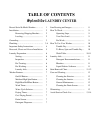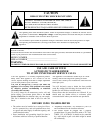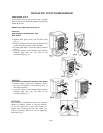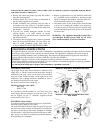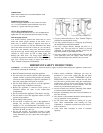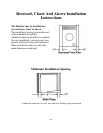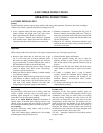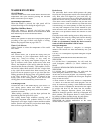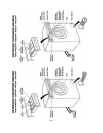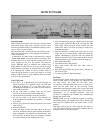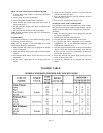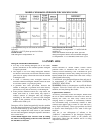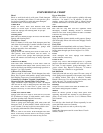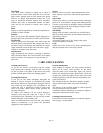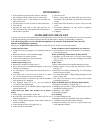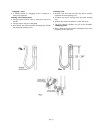
WINTERIZING
•
Turn off the hot and cold water source to machine.
•
Set machine to fill in regular cycle on warm wash.
•
Turn machine on for a fe
w minutes so machine can
take on any water.
•
Lift inlet hoses to assure no water is left in inlet hoses.
•
Turn unit off.
•
Advanc
e the wash timer to spin cycle and turn on.
This will activate the water pump and will evacuate as
much water as possible.
•
Turn unit to off.
•
Place a towel under the drain filter area and remove
drain filter. This will drain any water left in the bottom
of unit.
•
Install drain filter correctly to assure it does not leak
water.
•
In extreme conditions you may wish to completely
remove the inlet hoses.
•
Complete
Page 14
Washer Does Not Start
•
Washer may not be plugged in or connection may be
loose.
•
House fuse blown or circuit breaker tripped.
•
T
imer knob not in correct position.
•
Cycle selector knob not in correct position.
•
Door is not securely shut.
Washer Stops During
Cycle
•
Drain hose is kinked or clogged (Fig. 1).
•
House fuse blown, circuit breaker tripped, or wall plug
not firmly in receptacle.
•
No more than 6" of the drain hose should insert into a
standpipe.
•
The outlet end of the drain hose
must be at least
20" (50 cm) above the base of the machine.
•
Assure an air break is available to prevent the machine
from siphoning in a standpipe.
•
The standpipe should be at 25" (62 cm) minimum
34" (86 cm) maximum height.
•
Assure the drain lo
op or suitable clamp to support drain
hose has been used.
Water Does Not Enter The Washer, Or It Enters
Slowly
•
Water supply is
not adequate in the area.
•
Hot and cold water faucets for the inlet hoses are not
turned completely on.
•
Water is being used els
ewhere in the house, when the
washer is running.
•
Water inlet hose filter are clogged (Fig. 3).
•
Water inlet hoses are kinked.
Wash And Rinse Water Temperatures Are Incorrect
•
The hot water hose and cold water hose are connected
to the wrong faucets.
Water
Is Entering Washer But Tub Does Not Fill
•
Standpipe for the drain hose is not the correct height.
(Fig. 2), drain hose is to far into standpipe or air break
does not exist.
Water Leaks
•
Hose connections at faucet and/or machi
ne not tight.
•
Rubber washers are not inside the metal hose conne
c-
tors (Fig. 3).
•
Drain hose not securely fastened (Fig. 1,2). Drain pipes
in the house are clogged.
•
Too much detergent or a high
sudsing detergent in soft
water is being used.
•
Soil may be on the door seal or gasket of the washer
preventing a tight seal.
Water In Washer Does Not Drain Or Drains Slowly
•
Drain hose is kinked or clogged (Fig. 1).
•
Standpipe
does not have a large enough diameter and is
slowing the draining process.
•
Machine is over soaped.
•
Wash filter plugged.
Over S
udsing
•
Too much detergent used.
•
Detergent used is not compatible with water conditions.
•
Garments were pretreated, before wash
ing.
•
Additional laundry aids such as oxygen bleach may
cause additional sudsing.
AV O I D
-
SERVICE CHECK LIST
You may save the cost and inconvenience of an unnecessary service call by first reviewing this easy
-
to
-
use check list
of the most frequently encountered situations that are not the result of defective workmanship or materials.
You
will be charged for a service call while the appliance is in warranty if the problem is not caused by
defective workma
nship or materials.
Review this
Avoid
-
Service Check List
before calling for service. It may save time and expense.



